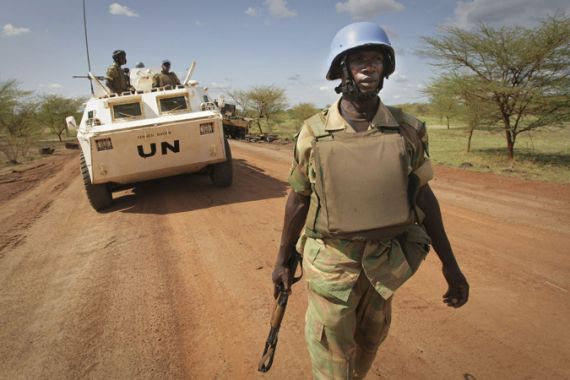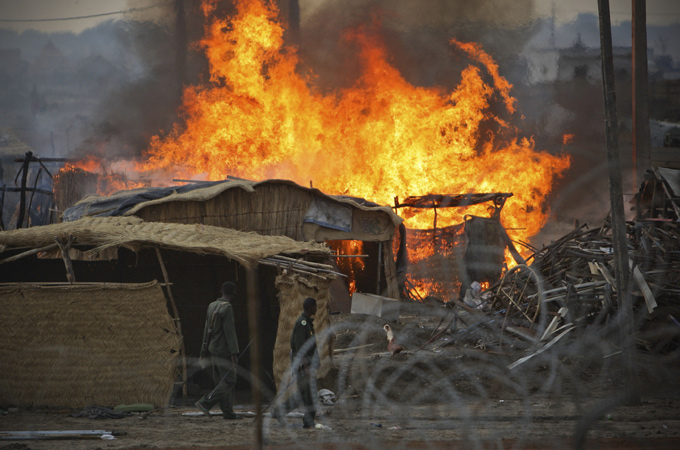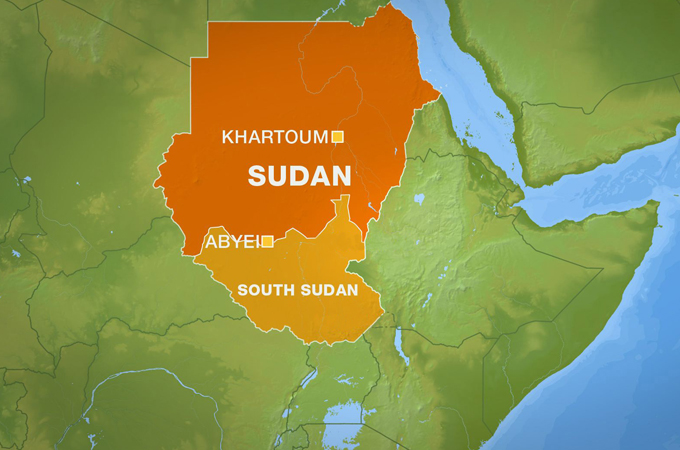Sudan agrees to demilitarise north-south zone
Announcement comes 10 days after the north seized the disputed Abyei region, prompting tens of thousands to flee.

 |
| Northern troops seized Abyei on May 21, prompting tens of thousands of people to leave the disputed region [Reuters] |
North and south Sudan have agreed to set up a demilitarised zone along their shared border, as the south moves closer to independence.
The announcement, made by the African Union (AU) on Tuesday, comes 10 days after the north seized the disputed Abyei region, prompting tens of thousands of people to flee.
“The agreement … establishes a Common Border Zone between North and South Sudan, which is to be demilitarised and jointly monitored and patrolled,” an AU statement said, without adding further details.
Alex de Waal, an AU adviser who has facilitated negotiations on security issues between Sudan’s north and south regions, said the parties agreed to the move on Monday during talks in Ethiopia’s capital, Addis Ababa.
The common demilitarised zone will stretch along the length of the 2,100km north-south border.
Colonel Philip Aguer, a spokesman for the south’s army, said the southern military will support the agreement “100 per cent” if both sides can agree on the actual border.
“To me that is a good agreement, but the issue now is where is the border,” he said.
Princeton Lyman, the US special envoy to Sudan, said the agreement on a demilitarised zone was an important step, but noted it did little to resolve the Abyei dispute.
“It’s an important step … it provides for demilitarising the border and sharing the monitoring, but it doesn’t deal with the current crisis that is going on in Abyei,” he told Al Jazeera.
‘Most serious crisis’
Lyman called the situation in Abyei “one of the most serious crisis we’ve had in the Comprehensive Peace Agreement”, referring to the 2005 peace deal that ended Sudan’s civil war.
Khartoum sent tanks and troops into Abyei on May 21, and has since defied calls from the UN, the US and south Sudanese officials to withdraw, saying the land belongs to the north.
Southern officials have sought to play down the tensions over Abyei, with Riek Machar, the south Sudan vice-president, saying on Monday that the two sides would form a committee to resolve the dispute.
In Geneva, Adrian Edwards, a spokesman for the UN High Commissioner for Refugees, said that a field visit to Abyei town had found the area “virtually emptied” of its estimated population of 50,000 to 55,000.
Sporadic shooting could be heard as late as on Monday.
“Large numbers of fighters were present on the streets. Pilfering was openly going on, with people apparently organising batches of stolen belongings,” Edwards said.
South Sudan is scheduled to declare independence in July, but the two sides have yet to settle issues such as the position of the common border and sharing oil proceeds.
The south faces a host of challenges as it heads towards secession, including internal rebel movements, a serious lack of infrastructure and widespread illiteracy.
Message to UN
In another development on Tuesday, Sudan informed the UN chief that it wants the UN peacekeeping force to leave its territory when south Sudan becomes independent on July 9.
Daffa-Alla Elhag Ali Osman, Sudan’s UN ambassador, said he delivered a letter to Ban Ki-moon rejecting his proposal for a three-month extension of the mandate for the 10,400-strong peacekeeping force, which expires on July 9.
 |
Ban said he wanted the extension to assist both sides to maintain calm and resolve outstanding issues, especially the future of Abyei.
But Osman said any attempt to justify extending the UN mission beyond July 9 to resolve pending issues “would not be right”, explaining that these issues would be resolved through “serious negotiations between the two parties”.
He said keeping the status quo, with northern forces kept north of Bahr el Arab and southern forces south of there, could help both sides reach a new political and security agreement that could include the deployment again of north-south military forces, or perhaps joint police forces or a small African force.
He said an international monitoring presence on the border is also currently being considered.
Alain LeRoy, the UN peacekeeping chief, told the Security Council that in light of the letter from the Sudanese government, the UN is ready to deploy the mission to south Sudan.
Outstanding issues
In his comments on Tuesday, Osman said that the Sudanese government is committed to peacefully resolving all outstanding issues including boundaries, wealth sharing, citizenship and international agreements.
He also pledged that Sudan would withdraw its forces from Abyei town when an agreement is signed ensuring security and stability in the area.
For his part, Ezekiel Lol Gatkouth, a Southern Sudanese envoy to the UN, said his government’s goal is peaceful coexistence between the two neighbouring states of Sudan and south Sudan.
But he said that “recent events have demonstrated how great a challenge this will be, and that continued third-party support will be critical if it is to be achieved”.
He urged the Security Council to demand that Sudanese forces withdraw from Abyei “immediately and unconditionally”.
Gatkouth, however, said his government’s “overriding priority” is to ensure the UN’s ongoing support for north-south security arrangements, especially at the border.
He said monitoring the border will require more troops than the 7,000 recommended by Ban, emphasising that “the UN must do what is necessary to promote the security of both states”.